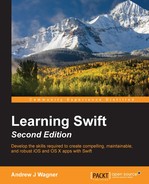In this chapter, we have developed a great basis for Swift knowledge. We have learned about the various built-in mechanisms Swift has for representing complex information in expressive and accessible ways. We know that, by default, we should declare information as a constant until we find a practical need to change it, and then we should make it a variable. We have explored how every piece of information in Swift has a type associated with it by the compiler, whether it is through type inference or declared explicitly. We are familiar with many of the built-in types, including simple types like String, Int, and Bool as well as containers like tuples, arrays, and dictionaries. We can use the console output to better investigate our programs, especially by using string interpolation for dynamic output. We recognize the power of controlling the flow of our programs with if statements, conditionals, switches, and loops. We have functions in our skill set to write more legible, maintainable, and reusable code. Finally, we have seen an example of how all of these concepts can be combined to write a full program.
As a challenge to you, I suggest you fix the final program so that it stops trying to assign shows if there are not enough invitees. When you can do that, you are more than ready to move on to the next topic, which is types, scopes, and projects.
These are all tools that we can use to write even more organized code and they will become more critical as we write larger and larger projects.
